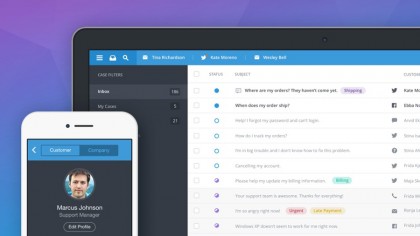How to run your business without an office
Looking towards a more fluid and flexible mobile working environment
Essential tools
Your virtual office can take many forms when you come to set it up. The number of tools that have become available over recent years offer a rich pool to create your own virtual office to suit your particular needs. Some of the best tools you could use to create your virtual office include:
Dropbox Business: The business version of this popular file storage and exchange service is vital to the smooth running of your virtual business.

Skype for Business: Hold meetings and collaborate with members of your virtual team with a low-cost monthly subscription. And you can of course make a few calls, too.
Hootsuite: Manage all of your business social media in one place, and also provide social customer services support as well as develop social marketing campaigns.
Google Apps: Working on the move requires basic office tools such as a word processor and spreadsheets. Google enables collaborative working across multiple devices, and these services integrate with Gmail and Calendar.
Evernote Premium: The premium version of Evernote offers collaboration across teams. As all team members can give feedback in a single app, virtual workforces can effectively work together.
KashFlow: You'll need to manage the financial aspects of your business. This cloud-based accounting application can also handle payroll for your virtual team members.
Sign up to the TechRadar Pro newsletter to get all the top news, opinion, features and guidance your business needs to succeed!

Desk.com: Managing customer services has in the past meant large call centres. With Desk.com you can manage this aspect of your business as easily as your social media.
Receipt Bank: Even running your business with digital tools, paper still needs to be managed. This receipt capturing application is a superb addition to your digital office.
iZettle: Take payment from your customers anytime anywhere with this handy plug-in card reader.
Trello: This app is like a to-do list on steroids. Forget about email threads, this application allows efficient project management at a single glance.
These are just some of the tools that can be used to create the ultimate mobile office. What is clear is that many of these tools will converge over the next few years. Where you would today have several apps on your phone or tablet to help run your business, in the future multifunctional apps will become the norm.
Spencer Bradshaw, head of solution architects and advanced applications EMEA at ShoreTel, commented: "In today's hyper-connected society, mobile brings business value. However, mobility technology specifically designed for the enterprise was, until recently, only available to large, global organisations capable of huge deployments and out of the reach of SMBs.
"Now SMBs need to take full advantage of such technology to be more agile, respond faster and become more competitive. By rolling out one user experience across mobile devices and traditional fixed devices an SMB can achieve business efficiencies, which is especially important in the age of BYOD."

Economy of skills
The type of business you are running will have a major impact on whether you can feasibly run your enterprise with mobile digital devices. Information-based business are of course the ideal candidates for virtual management. Deloitte commented: "Workplaces will no longer be a site of 'containment' but a place where people meet, learn and share."
Lalla concluded: "With the workplace changing, job responsibilities are being met at home, at client locations, even in public spaces like coffee shops and public transportation, so mobility has become a priority.
"Amid the flux, mobile technologies and alternative interfaces are playing an increasing role – laptops, tablets, mobile phones, 2-in-1s, thin clients and desktop virtualisation introduce unprecedented versatility into the IT toolkit."
The Society for Human Resource Management (SHRM) points out: "Effective leadership is the number one factor that influences success in a virtual organisation. Maintaining cultural identity, employment brand and employee/manager satisfaction requires consistent and regular communication. Leadership skills are even more essential for virtual work."
Working spaces then can be anywhere. There will be caveats in that as most businesses scale they inevitably need physical office space. But the future will see this becoming a less frequent occurrence, as businesses start in the virtual space and remain in this environment even when they grow. Next-generation mobile devices will deliver this ability.